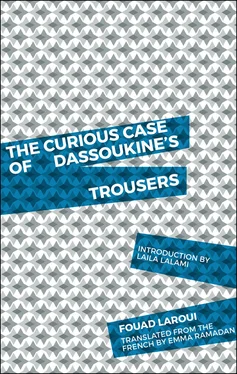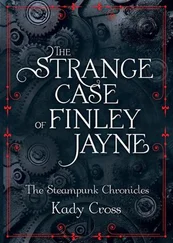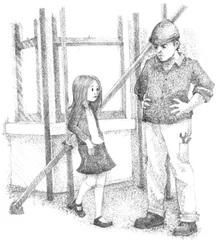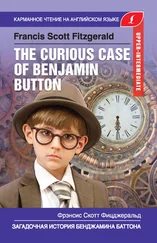Imbecile!
AMIR ( sticks his head out of the small opening of the door )
Philosopher! Go on then, hey, philosopher! ( He turns toward the audience. ) She never even asked me what I do now.
(A VOICE RISES FROM THE AUDIENCE:)
What do you do now?
AMIR
I’m a philosophy professor, of course!
He takes a deep bow.
He woke up from a bad sleep, populated with djinns and demons, and the first thing he saw, before even being able to murmur “ staghrifoullah ,” was a gnome. And this gnome, who resembled his son, was holding in his hands a picket sign imprinted with only one word: liberty. The child (or the dwarf?) began to speak — it was strange, he had the voice of an adult. But what was he saying?
“Father…and my liberty?”
Why are you calling me father…Omar wanted to ask, vexed, but the words never came: the gnome’s face had just undergone the subtlest of transformations — it was and was no longer his son, as if oscillating between two faces, one lost, the other found again. What was the meaning of this mystery? Omar wanted to ask his wife, who had just materialized by the bed — or before him? What was this phenomenon? He saw her in a chiaroscuro, simultaneously from the front and in profile, he saw her as he had never seen her before — but had he ever seen her before? It was as if it were a stranger who was standing there, somewhere, in his living space. Would she dare to breathe? She did better: she apostrophized him. His mouth opened like a canteen. She’s apostrophizing me! I’m not even sure what that word means, but that’s probably what she’s doing — what she’s daring to do — and this is probably what they call “the signs of the end of times.” The Hour is approaching, the tombs will be dug up, the earth will vomit its entrails…This woman, bestowed upon me by a fat’ha in a dark house, dares to speak to me. What is she saying? I’ll settle the score with her later. For the moment, let’s listen.
“Man, I want to be free.”
Where is that damned gnome? Omar lowered his eyes and saw a child watching him, his eyes big, opened wide, as if filled with limpid water. And the child repeated that scandalous word “liberty,” then raised his hand and presented his palm to his progenitor: the impious word was displayed on it, etched with ash.
Servant! Maid! Bring me a belt, a bludgeon. I have important business: I must correct wife and child. They address their lord and master without being authorized to do so — did I even summon them? What is this? The start of a debate? I only debate with my peers — I only listen to the sheikh —and he only listens to God. That’s the sacred chain. If even one link cedes, there’s dissent, the thread is broken, the text is unwound. Order keeps the world spinning on its axis, I’ve been taught that since I was a kid, on the braided mat, in the swaying of bodies through which wave after wave of knowledge enters, raising the walls and erecting the city — where the space belongs to men. Hey, servant! The straps! But what…Here she comes, silent, but voluble in movement, her little fist raised — that limp body can tighten? But this madness is never-ending, but her, too, but…she’s brandishing a picket sign. Omar leans in, adjusts an imaginary pair of spectacles and deciphers the consonants forming the word karama . Alright then. The maid too? Asking for dignity now…What place does sentiment have here, how is intellect infecting girls, are you something other than exploited at will? Where’s the whip? Forget the whip. Bring me a harness. Wife, the harness! It’s for the maid, she’ll bring me the bludgeon, I’ll knock out my disgraceful son — but not before he’s brought me the poker. I intend to burn it into your flesh, my wife — but first bring me the harness — I intend to engrave it with a few appropriate sentences — we are not a unique people as claim the chess players, but I am the master in my home. Bring me some coal!
And then the world started to spin. They came at him from different angles, sideways, determined — it seemed to him — to shatter the sphere revolving around him. Perhaps this was the moment to propose a truce, an arrangement? He rejected the idea for what it was: the work of the Devil. Besides, it was he who possessed the soul of his son and (if they had them) of his wife and servant. They continued to spin around him, sometimes breaking the circle to draw near his eyes like a flash of lightning, murmuring those words of liberty and dignity that their clumsy fingers had written on the picket signs. He suddenly remembered it was his fingers that had done it. In other words, they had stolen his work! What right did they have? These two women (these two phantoms tormenting me) don’t even know how to read — in any case he preferred it that way — which is certainly clear now. But then, the picket signs? Did the troll…? Let’s try a diversion. In a brusque movement, Omar seized his wife’s wrist, but his fingers closed on empty space, he tried to slap the little servant and met a void, he didn’t dare bite his son’s neck, afraid of tasting his own blood. My God, will this trial ever come to an end? Why, why did you forget about me…
The despairing man woke up, this time for good. He was covered in sweat. His wife was breathing softly next to him, in a deep sleep. Her regular breathing was barely audible. Outside, the city was humming with the peaceful murmur of a sleeping beauty. So, it had been a bad dream. Curse the Devil! He sat up in his bed, then got up and put on his slippers, preparing to do his ablutions. It was time to give thanks to God.
As he lumbered toward the bathroom, he saw, in the hallway, carefully positioned against the wall, the picket sign he had made the night before. Ah yes, the demonstration, this afternoon…He would be there. Without fail.
1. “Philosophers have only interpreted the world; the point is to change it.”
MARX, KARL. “Theses on Feuerbach.” Karl Marx and Frederick Engels, Selected Works, Volume One. Trans. W. Lough. Moscow: Progress Publishers, 1969. 13–15.
2. “This one went forth in quest of truth as a hero, and at last got for himself a small decked-up lie: his marriage he calleth it.”
NIETZSCHE, FRIEDRICH. Thus Spake Zarathustra: A Book for All and None. Trans. Thomas Common. Mineola: Dover Publications, 1999.
3. “The eternal silence of these infinite spaces frightens me.”
PASCAL, BLAISE. Pensées. Trans. W. F. Trotter. New York: E. P. Dutton & Co., 1958.
4. “To the eyes of the world still intact / It feels grow and weep, unspoken, / Its sharp, underlying crack / Do not touch, it is broken.”
PRUDHOMME, SULLY. “Le Vase Brisé.” Stances et Poèmes. Paris: Alphonse Lemerre, 1866.
Translated by Emma Ramadan.
KHOURIBGA, OR THE LAWS OF THE UNIVERSE
1. “Under the torrents of a tropical sun…which spreads heat over our fallow lands.”
FLAUBERT, GUSTAVE. Madame Bovary. Trans. Raymond N. MacKenzie. Indianapolis: Hackett Publishing, 2009.
2. “The spokes of the wheels converge at the hub. They converge toward the empty space. And it’s thanks to the empty space that the chariot advances…The vase is made of clay but it’s the empty space that makes it a vase.”
Paraphrase of Chapter 11 of the Tao te Ching , a Chinese classic text attributed to LAO TZU.
Emma Ramadan’s translation of Fouad Laroui’s French.
FIFTEEN MINUTES AS PHILOSOPHERS
1. “When I consider the short duration of my life, swallowed up in the eternity before and after, the little space which I fill, and even can see, engulfed in the infinite immensity of spaces of which I am ignorant, and which know me not, I am frightened, and am astonished at being here rather than there; for there is no reason why here rather than there, why now rather than then. Who has put me here? By whose order and direction have this place and time been allotted to me?…The eternal silence of these infinite spaces frightens me.”
Читать дальше












